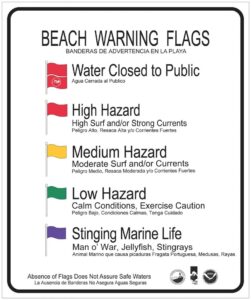Summer is in full swing, which mandates a trip to the beach. With the most beautiful beaches in our backyard, it’s a shame not to take full advantage.
“Open water swimming at the beach is adventurous and can provide a challenging workout,” says Dustyn Shroff, Vice President of GreatFlorida Insurance, Florida’s largest independent boat insurance agency.
While swimming in the ocean is fun, changes in water depth and hidden currents also make it unpredictable. Here are a few tips to keep your beach trip enjoyable and safe.
Swimming at the Beach
The American Red Cross recommends to always stay within your fitness and swimming capabilities.
Swim in a supervised, marked area with a lifeguard present, and swim with others. Never swim alone.
“Continually supervise children around water and never leave young children unattended around water, says Dustyn Shroff, Vice President of GreatFlorida Insurance, Florida’s top independent boat insurance agency.
Stingray season is from April – October, when entering the water look around the edge, where they generally hang out. A purple flag at city beaches will provide a warning.
Rip currents and undertow currents are the biggest dangers to swimmers at the beach. Swim in an area where there is a lifeguard on duty or ask other swimmers about the conditions in the water. If you are caught in a rip current, swim parallel to the shore until you are out of the current. Once you are free, turn and swim toward shore. If you can’t swim to the shore, float or tread water until you are free of the rip current and then head toward shore.
If you find yourself pulled out to sea by a current, don’t panic. Try to keep calm to conserve energy. Relaxing is also the best way to stay afloat. Breathing deeply draws more oxygen into your body, lowering your overall density and thereby buoying you up in the water. Laying back also helps you float, because it makes it more difficult for water to flow around your outstretched body and force it downward compared to when you’re upright. If necessary, kick your legs and wave your arms very gently, cupping your hands to push water downward and turning them on edge to slide them upward.
Do not swim at any beach right after a heavy rain. Runoff following a heavy rain may result in a high bacteria level.
The Florida Department of Environmental Protection has a beach flag program to alert beach goers of surf conditions. Also, to check conditions before you head out, go to visitbeaches.org/ for updated information on specific beaches.
GreatFlorida Insurance provides Floridians with boat insurance policies for various kinds of watercraft. For more information call us at 888-478-7801 or visit us online at www.greatflorida.com.





